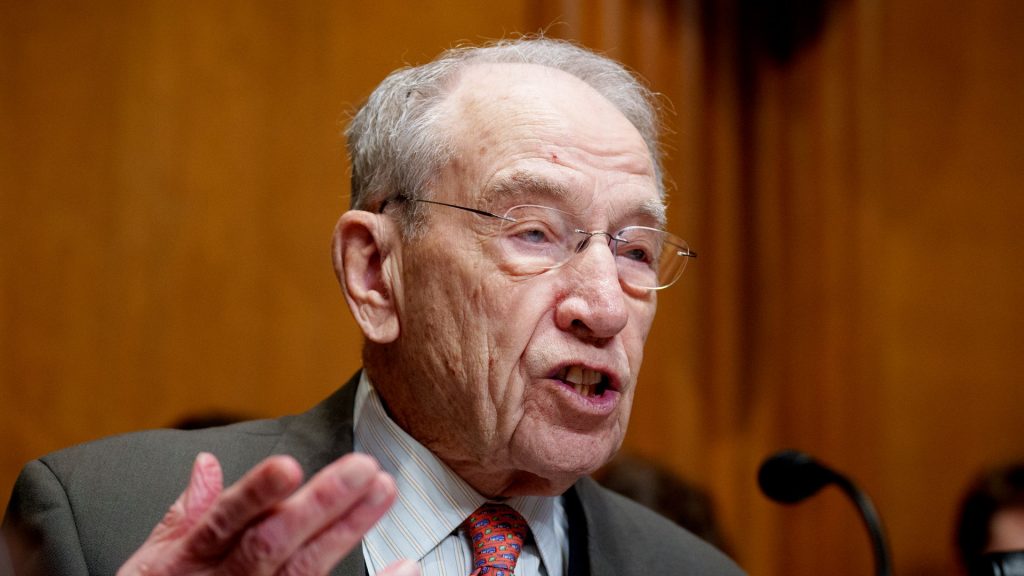Claims that Biden officials placed migrant children with unvetted sponsors based on incomplete data

Sen. Chuck Grassley, R-Iowa, shared data in August that he said revealed the Biden administration placed more than 11,000 migrant children with unchecked sponsors. There was just one problem: The data he released doesn’t say that.
Grassley issued his findings in the Senate Judiciary Committee, which he chairs, adding that it has taken him years to acquire records on the placement of migrant children because of what he called stonewalling by the previous administration. Grassley has pushed for changes in the Office of Refugee Resettlement for more than a decade. He pressed the Obama and Biden administrations, as well as both Trump administrations, to improve how sponsors are vetted before unaccompanied migrant children are placed in their care.
“My oversight continues to expose disturbing evidence that the Biden-Harris administration turned a blind eye to tens of thousands of kids who needed proper supervision and care,” Grassley said in a Senate Judiciary Committee press release. “It’s appalling to prioritize speed and optics over the safety and well-being of children.”
He released figures asserting that 11,488 migrant children had been placed with unvetted sponsors. He also claimed the Biden administration failed to conduct FBI criminal history checks and didn’t conduct home studies for 79,143 migrant children under age 12 between January 2021 and 2025.

But an analysis of the data by Straight Arrow News tells a different story.
Grassley’s figures pushed a narrative that, under the Biden administration, thousands of migrant children were placed in the care of adults the Office of Refugee Resettlement didn’t properly vet. That included conflating the Justice Department background checks with the FBI’s requirements that certain sponsors follow, and when home visits are needed.
The senator miscounted the number of children who required extra safety measures for placement, which happened during Biden’s term.
Grassley also appears to have misstated the terms of the William Wilberforce Trafficking Victims Protection Reauthorization Act of 2008, also known as TVPRA. The law was intended to combat forced labor and sex trafficking by expanding victim protections for foreign nationals. It does not require a person wishing to sponsor a child to undergo an FBI criminal history check or provide digital fingerprints.
“The news release [from Grassley] misrepresents both the data and the law, which is fundamentally problematic,” Melissa Adamson, staff attorney at the National Center for Youth Law, told SAN.
A former Biden administration official who worked in a senior position at the Office of Refugee Resettlement also told SAN that Grassley’s interpretation is incorrect. The official spoke on the condition of anonymity as they were not authorized to speak publicly about the data.
The official said Grassley conflated what’s required under the 2008 law with what people have to submit to the FBI. They said the former required the secretary of the Department of Health and Human Services (HHS) to, at a minimum, verify a sponsor’s identity and relationship to the child and determine if the person has engaged in any sort of activity that would be a risk to the child.
Grassley’s office didn’t respond to SAN’s requests for comment.
An HHS spokesperson referred SAN to Grassley’s report. The agency did not respond to follow-up questions regarding the validity of the data Grassley released.
Conducting background checks on sponsors
The Biden official said that the Office of Refugee Resettlement conducts background checks that differ based on the type of sponsor and the sponsor’s relationship to a child.
They said the office uses several categories to define sponsors for unaccompanied migrant children placement cases:
- Category 1 are parents, legal guardians or qualifying step-parents who have legal or joint custody of the child.
- Category 2A includes brothers, sisters, a grandparent or a close relative, such as an uncle, aunt or first cousin, who previously served as the child’s primary caregiver. It can include biological relatives, half-siblings and relatives through marriage.
- Category 2B are immediate relatives who weren’t previously a child’s primary caregiver.
- Category 3 is for distant relatives and unrelated adults.
- Category 4 means no sponsor was identified for the child.
The office prefers placing children with legal guardians or parents when releasing a child from custody. However, it does not do so if a court has ordered termination of parental rights or if a child’s well-being is at risk with the adults, among other circumstances.
There are special circumstances, according to the office, for a minor who arrived in the U.S. with their own biological child. In that case, the office has identified a sponsor to care for both.
Grassley: Children placed with unvetted sponsors
Grassley said in his report that “11,488 migrant children were placed with unvetted sponsors who were not their parent or legal guardian and who were not fingerprinted or did not receive a background check.”
The former Biden administration official called that claim false, adding that under long-standing policy, only 2B and 3 sponsors are required to submit fingerprint-based background checks. The 2A sponsors aren’t required to submit fingerprints, the official said.
“So when you see in the Grassley report that they didn’t go through fingerprints, that’s true,” the official said. “But the way that it’s interpreted in the report as though they were not vetted is absolutely not true.”
The data Grassley received from HHS is incomplete and included two similarly written data points, SAN found. HHS told the senator that 5,660 children were placed with 2B and 3 sponsors with a “Fingerprint and/or Background Checks Not Requested and/or Not Received” distinction, and that 84 children were placed with 2B and 3 sponsors marked as “Neither Fingerprint nor Background Check Requested and/or Received.”
HHS said 100,775 children were placed with the 2B and 3 sponsors, but it failed to produce relevant data for 89,287 children who were placed with the sponsors.
The Biden official added that every sponsor, regardless of category, is required to undergo a Justice Department public records check, a sex offender registry check, and interviews with the office, and to complete a “very lengthy” application process.
Home studies for migrant children
Grassley said in his release that the HHS data he requested, covering Biden’s presidency, showed that home studies weren’t conducted for 79,143 migrant children under the age of 12, including 1,961 children who were placed in households where a study was recommended.
“HHS regulations require home studies before releasing a child 12 years or younger to a sponsor who is not their parent or legal guardian,” Grassley alleged. “The Biden-Harris administration ignored this rule and failed to conduct home studies for approximately 10 percent of migrant children who were recommended to have one.”
Grassley misrepresented legal requirements for home visits.
His claim, highlighting the 1,961 children placed in homes, doesn’t match the 79,143 placements. The latter number comes from a sum of home studies that were recommended but not conducted for all children who were placed with immediate relatives who weren’t the child’s caregiver or distant relative, as well as unrelated adults. The office holds final authority on whether a child will be released to the home, weighing recommendations, assessing the sponsor and considering the child’s needs.
The 79,143 home studies for unaccompanied migrant children under age 12 that weren’t conducted between Jan. 20, 2020, and Jan. 19, 2025, are counted without regard to the 2024 rule change. That rule required home visits for children under 12 who would be released to an unrelated adult, or if the unrelated adult has currently or previously cared for or applied to sponsor a child.
The Biden official clarified that the data HHS shared with Grassley isn’t refined to show the rule change. Instead, it combines sponsor categories 1, 2 and 3 with the status of home studies for unaccompanied migrant children under 12 years of age. No information was shared on Category 4 placements. The data covered studies between Jan. 20, 2021, and Jan. 19, 2025.
According to the Office of Refugee Resettlement, home studies assessed a sponsor’s ability to meet a child’s needs, prepared the sponsor for the child’s release and corroborated information on the sponsor.
The only time a study must be conducted is if it falls under TVPRA mandates or if a federal field agent requires one. Data shared with Grassley does not include information about that.
“A home study consists of interviews, a home visit, and a written report containing the home study case worker’s findings,” the website stated.
The Biden administration official said the TVPRA mandates home studies for child victims of human trafficking, those with a disability who are survivors of physical or sexual abuse, and if a sponsor represents a possible safety risk to the child.
Adamson, of the National Center for Youth Law, praised Grassley for being one of the few lawmakers focused on the Office of Refugee Resettlement. However, she noted that misrepresenting the data and the agency’s legal requirements is problematic.
“It’s not correct,” she said. “It’s not accurate.”
The Biden administration official added that Grassley’s presentation of the data would harm the public’s perception of the Office of Refugee Resettlement and cause people to question the safety of unaccompanied migrant children in the agency’s care.
“Some of this is just not done in good faith in terms of a true analysis of what the requirements were and what was done,” they told SAN.
The post Claims that Biden officials placed migrant children with unvetted sponsors based on incomplete data appeared first on Straight Arrow News.





